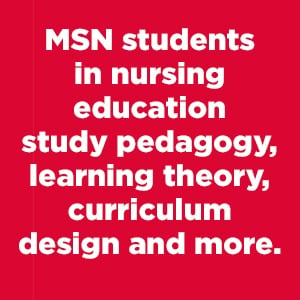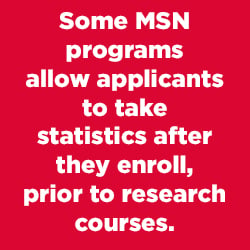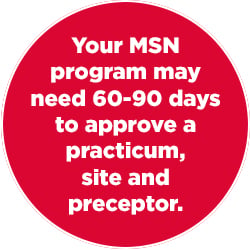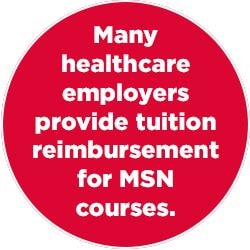FAQ: MSN in Nursing Education Online

MSN nurse educators understand that effective teaching involves more than a one-way conversation. They know student participation is key. They also know how to choose the right learning strategy for the audience and instructional setting. Their work helps RNs retain clinical information and apply it on the job. The counseling and feedback they provide helps patients put advice into action and improve their health.
Some RNs with a master’s in nursing education pursue a college or university teaching career. They may instruct aspiring nurses in complex care practices, the nuances of patient interaction or standards for safety and professionalism. Their advanced research and evidence-based practice experience also brings theoretical concepts to life for students, helping them acquire a broad scope of clinical knowledge.
If you’re ready to become a nurse educator but concerned about fitting school into your busy schedule, an online MSN degree program could be the solution. The links below provide answers to the most common questions RNs have about MSN programs in nursing education and the process of studying online.
What Is a Master of Science in Nursing Education?
The MSN in nursing education is for RNs who want to develop their skills in teaching, training and curriculum design. Graduates with this degree are also prepared to assume many different instructional roles. They may work directly with patients in a hospital or healthcare setting, or manage corporate wellness programs for employees. They are also qualified to teach at the college level and work with students in vocational training.
Many MSN graduates sit for the Certified Nurse Educator (CNE) exam as well, adding that prestigious credential and skill set to their resume.
What Do MSN Nursing Education Students Learn?

Nursing education master’s programs prepare students to teach and lead different types of learners. Whether you plan to work with patients, nursing professionals or the general public as an instructor, you will benefit from coursework that focuses on the essential skills required to pursue teaching opportunities.
As you progress toward your MSN degree, you will:
- Develop core teaching practices for group and one-to-one instruction
- Build your skills in academic teaching for clinical, didactic (classroom) and online college courses
- Learn how to tailor learning strategies to specific audiences of students
- Gain expertise in curriculum development and student assessment
- Build your knowledge of learning styles and communication strategies
- Learn to create professional trainings and community health workshops for a range of participants
Which Courses Do I Take to Become a Nurse Educator?

You’ll take courses that introduce you to teaching pedagogy and learning theory, highlighting best practices in education. The field experience practicum or internship you complete for your MSN will also help you develop your own instructional methods.
Lamar University’s online MSN in Nursing Education gives nurses the opportunity to explore different forms of teaching and learn the clinical and classroom skills needed to launch a career in education. Students complete 37 hours of coursework to earn the degree.
In addition to core MSN subjects such as healthcare theory, finance and policy, students take the following classes focused on nursing education:
- Role Development & Learning/Teaching Theories
- Measurement & Evaluations
- Curriculum Design
- Advanced Health Assessment
- Advanced Pathophysiology
- Advanced Pharmacology
- Education Practicum I (curriculum applications in teaching)
- Education Practicum II (measurement/evaluation applications for academic systems)
MSN nursing education students at Lamar University also complete graduate-level coursework in research and evidence-based practice, which requires statistics as a prerequisite. If you did not take statistics for your BSN degree, contact an enrollment specialist at 866-223-7675 to discuss your options for meeting this requirement.
What Is Pedagogy?

When you study teaching pedagogy, you learn about the instructor’s role and practices. You also consider the purpose of traditional teaching methods and the value in innovative approaches to learning.
Pedagogy for nurse educators centers on finding the right instructional strategies for the setting, audience and learning goals. For example, you might construct exercises that teach a nursing process or ones that compare clinical and didactic course models.
The nursing education career you wish to pursue will dictate some of your studies in pedagogy. If you want to become a college professor but you don’t have any experience in academic teaching, it may be necessary to learn the fundamentals of grading or generating tests and assignments as part of your practicum. If you’re interested in pursuing a corporate wellness career or working with patients as a health educator, your audience and teaching strategies will be different, as will the outcomes you seek.
Regardless of your instructional interests, the pedagogy you study as a master’s student is meant to provide a solid foundation for your career as a nurse educator.
Is It Common for Nurse Educators to Teach College Courses
Yes. Colleges and universities regularly recruit online MSN graduates in nursing education for faculty positions, teaching on campus, online or both. A severe nursing faculty shortage is driving sharp demand for qualified nurse educators interested in a full-time or part-time academic career.
Online MSN graduates may even have an advantage in some respects. Teaching online after learning that way gives you firsthand knowledge of the remote student experience. You may bring insight on the best assignment structures for distance learning or how collaborative projects can make the most of web-based tools and resources.
In providing nursing care to patients, I can work with a limited number of patients each day. In teaching students how to become nurses, I can have a greater impact on patients who the students will care for in the future.
– Dr. Eileen Curl,
Director of Nursing Research at Lamar University


Don’t be afraid to share your knowledge with others to help them grow in the profession.
– Dr. Judy Kaye Smith
Associate Professor of Nursing at Lamar University
Spotlight: Nursing Faculty Jobs in Texas

According to the U.S. Bureau of Labor Statistics (BLS), Texas has the second-highest employment level of postsecondary nursing instructors and teachers in America. This is no surprise when you consider that the state has more than 100 college and university nursing programs, in addition to vocational schools and diploma programs.
Texas’ two largest metro areas offer the most diverse array of teaching opportunities. Dallas-Fort-Worth-Arlington has the eighth-highest employment of nursing instructors in the nation according to the BLS, and North Texas is also among the top-paying regions for nursing instructors. UT Southwestern and five of the state’s other premiere teaching hospitals are also located in the area, along with numerous college and university nursing programs.
The Houston-Sugarland-The Woodlands metro area is home to the vast Texas Medical Center complex and its teaching hospitals, as well as its network of 48 member institutions. This part of the Gulf Coast also has one of the highest concentrations of college and university nursing schools in the state, including satellite programs that spread across South Texas. You don’t have to live in or near a big city to have an academic teaching career in the Lone Star State, however.
Odessa is one example of an area with both high nursing faculty employment and strong demand for instructors. The city’s population is only 123,334 but its status as a regional healthcare hub for the Permian Basin and rural communities of far West Texas creates an ongoing need for nurses. Thousands of new residents joining the booming local oil industry each year also help drive this demand. These circumstances result in excellent opportunity for nursing professors and often pay rates that are competitive with those in larger cities.
Why Are Accredited Nursing Programs Better? What Does Accreditation Mean?

If My MSN Program Isn’t Accredited, Can I Still Get a Job?

It depends on the position you seek, but your options will certainly be more limited. Your chance of being considered for most hospital and government positions in nursing education is low if your degree comes from an unaccredited school or program. The same goes for academic teaching positions at colleges and universities. Fairly or not, employers of any type may screen you out due to uncertainty about the quality of your education.
You may also lose out on job opportunities over concerns about liability. Due to the rise in degree fraud and diploma mills, lack of accreditation is seen as a red flag by some. Many employers examine job applicants and the schools they attended very closely for this reason. The American Association of Collegiate Registrars and Admissions Officers argues that suspect or counterfeit academic credentials can pose a risk to the public when graduates unprepared for their job duties are hired in fields such as healthcare. Employers are also mindful of this risk.
Studying in an accredited MSN program is ultimately the best way to prove that you’re well qualified and prepared for a career in nursing education.
Does Program Accreditation Affect Financial Aid?
- Federal loans and grants through the U.S. Department of Education
- State grants and scholarships
- State and federal loan repayment programs for healthcare workers
- Public service loan forgiveness programs
- Tuition reimbursement programs for government employees, service members and veterans
- Most employer-sponsored tuition reimbursement programs
How Can I Verify My MSN Program’s Accreditation Status?
What Is the MSN Admissions Process for Nursing Education?

You’ll submit an application as well as official transcripts documenting your BSN degree, previous courses and your final grade point average (GPA). You will also need to provide verification that your RN license is active. Some programs also request letters of recommendation, GRE or MAT exam scores, a personal statement, and other items they need to fully evaluate your application.
Many online MSN programs have a streamlined admissions process. You can usually complete the application online, and you may be able to have transcripts, test scores or other items sent electronically. In addition to the application, Lamar University’s online MSN in Nursing Education program requires:
- A BSN from an accredited nursing program
- An active and unencumbered RN license
- Official transcripts from all colleges and universities attended
- A cumulative 3.0 GPA in the last 60 hours of coursework
- A college statistics course (with a grade of C or better)
See Lamar University’s full admissions requirements for the online MSN in Nursing Education for additional details. Applicants with a 3.0 GPA or higher are not required to take the GRE or MAT.
If I Haven’t Taken Statistics, Will I Need to Before I Can Apply?

Statistics is a standard prerequisite for graduate research courses in nursing, so most MSN applicants will need that knowledge. Check with the master’s programs you are interested in, however, to see whether you can take statistics concurrently with your MSN courses.
If you meet all other admission requirements for Lamar University’s online MSN in Nursing Education but don’t have a statistics course, you can still apply. You’ll need to take it prior to enrolling in MSNC 5311, Nursing Research, however.
Can I Apply If My GPA Falls Short of the Minimum Requirement?
MSN admissions in nursing education can be highly competitive, but often programs recognize that otherwise qualified applicants sometimes miss the GPA cutoff. If you are concerned about your chances of being accepted to a certain program with your current GPA, speak with the enrollment specialist or graduate coordinator before you apply. You may be able to provide test scores or other evidence that you are prepared for the academic rigor of graduate study.
At Lamar University, online MSN in Nursing Education applicants must have a GPA of at least 3.0 or have their last 60 hours of college coursework evaluated to see if the 3.0 GPA can be met. A GRE or MAT is not required, but you must meet all other requirements.
What Is a Nurse Educator Practicum?
It’s the portion of your MSN coursework that allows you to gain teaching experience and put your ideas directly into practice. The practicum will usually take place at the end of your nursing education program. It may be a single course or separate courses focused on different aspects of instruction.
Is a Specific Number of Hours Required?
Each nursing program sets its own hourly requirement, often based on state or accreditor standards for nurse educator practicum experience.
How Do Online Students Complete a Nurse Educator Practicum?

The majority of online MSN programs in nursing education allow students to choose their practicum site and arrange for their preceptor. If you are considering programs outside of your home state however, or schools in your state that are a long commute from where you live, be sure to verify practicum location requirements before you apply.
Arranging your own practicum may be a little more work, but students often find there are benefits to doing so. Staying in your home community is one. You might even find a placement in a city where you’d like to work in the future. Seek out local practice opportunities that match your career goals, whether they involve working with patients, nursing staff, or nurses in training.
Some students are able to fulfill the practice experience requirement at their current workplace. This option often requires that you perform different duties than in your regular job or work with a different population than usual.
When Should I Arrange My Practicum?

The practicum hours are usually completed toward the end of your degree program, so you have plenty of time to consider the type of placement you prefer and to make arrangements.
Because your MSN program must approve your site and verify your preceptor’s qualifications, it’s best to submit your request 60-90 days before your practicum is scheduled to begin. That way you and the professor overseeing your practice experience have time to work out any issues that arise. It can also take time for your program to confirm all details with the local hospital, healthcare facility or other institution hosting you.
Will My Program Help Me Find the Right Placement?
If you’re having difficulty finding the right site or preceptor, don’t be afraid to ask for assistance. Just be aware that the amount of help your program can provide may depend on your location. If you live in a rural region or one with a limited healthcare network, your MSN program might not have immediate contacts in your area. Professors are often happy to offer advice, however, along with resources or referrals. They can also help you figure out the right search strategy to achieve placement success.
How Can I Become a Certified Nurse Educator (CNE)?

MSN in nursing education graduates can earn this valuable credential by passing the CNE examination given by the National League for Nursing (NLN).
The exam tests your knowledge of learning theory and educational best practices, as well as your ability to adapt teaching strategies to different audiences of students. You’ll answer a total of 150 questions, designed to assess your preparation for teaching in the classroom and clinical environment.
Once you pass the exam and earn your CNE credential, the NLN requires recertification every five years. At that time you’ll have two options: meet current standards for practice and professional development or simply take the latest version of the CNE exam. This process helps ensure that nurse educators keep their knowledge and skills up to date as part of their teaching practice.

What’s on the CNE Exam?
What Are the Benefits of Having a CNE Credential?
Becoming a Certified Nurse Educator makes sense regardless of your career goals. This valuable credential signifies that you’ve met the highest professional standards in nursing education, and employers recognize this distinction. Many prioritize job candidates with a CNE over those without one.
Adding this credential can increase your salary in your current position and give you access to better-paying jobs. If you’re interested in using your degree to start a healthcare training or consulting business, having a CNE can also enhance your credibility as a nurse entrepreneur.

What Score Do I Need to Pass the CNE Exam?
How Can I Become a Certified Nurse Educator (CNE)?

Where Are Nurse Educators in Demand?
Nurse educators are in demand across the United States. A look at the situation in Texas, Louisiana and Oklahoma demonstrates why this is the case. These neighboring southern states have many challenges in common, including the fact that they’ve struggled to hire the number of nurses required to care for their citizens. Each has also faced a nursing faculty shortage and issues providing patient education services to a large rural population, including many citizens with chronic health conditions.
Academic and healthcare employers in the following metro areas of these states have the most difficulty recruiting qualified nurse educator applicants to fill open positions. This translates to opportunity for new nurse educators.
| Metro Area | Demand Above National Average |
|---|---|
| Alexandria, Louisiana | 200% |
| Killeen-Temple, Texas | 160% |
| New Orleans-Metairie, Louisiana | 130% |
| Shreveport-Bossier City, Louisiana | 110% |
| San Antonio-New Braunfels, Texas Laredo, Texas Lake Charles, Louisiana |
90% |
| Monroe, Louisiana | 80% |
| Lubbock, Texas College Station-Bryan, Texas |
70% |
| Lafayette, Louisiana | 60% |
| Amarillo, Texas Odessa, Texas Baton Rouge, Louisiana |
50% |
What’s a Typical Nurse Educator Salary?
Salaries vary between different nurse educator roles, so your earnings will largely depend on the career path you choose after graduation. For example, you may continue working in a healthcare setting, focus on corporate health and wellness or work in public health. Many MSN education graduates teach part time at a college or university even as they pursue other career goals, and that may factor into your income too.
Here are some typical jobs and pay rates for MSN graduates in nursing education.
| Job Title | Average Annual Salary |
|---|---|
| Pharmaceutical Nurse Educator | $97,980 |
| Oncology Nurse Educator | $94,414 |
| Clinical Nurse Educator | $93,629 |
| Per Diem Nurse Educator | $92,032 |
| RN Educator | $87,666 |
| Pediatric Nurse Educator | $85,287 |
| Corporate Wellness Manager | $80,559 |
| Certified Diabetes Educator | $80,499 |
| Online Nurse Educator | $80,831 |
| Lactation Consultant | $76,787 |
| Vocational Nursing Instructor | $71,901 |
Is There More Demand for Professors Who Teach Clinical or Didactic Courses?

There is plenty of opportunity for MSN graduates interested in teaching all types of college courses. Nurse educators willing to split their time between clinical and didactic instruction or on-campus and online classes sometimes have the best chance of securing a teaching position.
AACN’s survey of college and university nursing programs found that 69% of vacant full-time faculty positions for the 2019-2020 school year required both clinical and classroom teaching. About 58% of programs sought out faculty candidates that fit their particular area of specialization. Roughly one in five nursing programs hoped to hire new nursing faculty that could also conduct research.
This data captures a point that’s essential to understand about part-time teaching as well: Candidates with the right skills, experience and flexibility to meet program needs are always in demand.
What Do Full-Time Nursing Professors Make?
| Academic Rank | Average Annual Salary | ||
|---|---|---|---|
| Public institutions | Private-Independent Institutions | ||
| Professor | $159,919 | $202,199 | |
| Associate Professor | $104,482 | $122,556 | |
| Assistant Professor | $91,408 | $108,202 | |
| Lecturer | $64,439 | $72,569 | |
How Much Does an Online MSN in Nursing Education Cost?

| Institution | Program Type | Total Hours | Tuition (6 credit hours) | Fees | Total |
|---|---|---|---|---|---|
| Lamar University | Online | 37 | $2,124 | Included | $2,124 |
| Southeastern Louisiana University | Online1 | 40 | $1,716.20 | In-State $928.70 Out-of-State $4,048.70 | In-State $2,644.90 Out-of-State $5,764.90 |
| Texas Tech Health Sciences Center | Online | 39 | In-State $1,566 Out-of-State $3,534 | $1,264.50 | In-State $2,830.50 Out-of-State $4,798.50 |
| University of Houston | Hybrid | 42 | In-State $3,613.92 Out-of-State $6,647.82 | $5012 | In-State $4,114.91 Out-of-State $7,148.82 |
| University of Oklahoma | Online | 32 | In-State $1,762.50 Out-of-State $5,690.40 | $995.63 | In-State $2,758.13 Out-of-State $6,686.03 |
| The University of Texas at Tyler | Online | 36 | In-State $2,250 Out-of-State $5,076 | $510 | In-State $2,760 Out-of-State $5,586 |
Is Financial Aid Available to Online Graduate Students?
Can I Use My Military Education Benefits for an Online MSN?

Yes. Both veterans and service members on active duty can use military education benefits for an MSN in nursing education. If you didn’t serve, but your spouse did, you may be eligible for transfer benefits. The degree program must be accredited, and your school must be eligible to accept tuition funds from the U.S. Department of Veterans Affairs.
Lamar University’s Veterans Affairs Office provides assistance to students using the Post-9/11 GI Bill or other military benefits to pay for an MSN degree. Staff can also help transfer military benefits from your spouse to help support your nursing education. Help and advice is available during each step of the process, from application to certification.
Do Employers Offer Tuition Reimbursement for Nurse Educators?

Yes. Many healthcare and higher education employers offer tuition reimbursement programs for RNs studying for a master’s degree, including those who wish to become nurse educators. Financial support of this type is one way medical institutions and their university partners are helping to address the nursing faculty shortage and encourage more RNs to move into teaching.
If you’re ready to go back to school for your MSN, check with your employer to see whether there’s a tuition reimbursement program where you work. And if you’re changing jobs while considering your nursing education master’s, be sure to ask whether this benefit will be part of your new compensation package.
How Do Full-Time RNs Manage Work and Graduate School?

Many nurses find their unique skill set is well-suited to the challenges presented by adding MSN studies to a busy career. As an RN, you’re already an expert in time management. You know how to shift priorities in a heartbeat when required. Nurses also have to exhibit grace under pressure and maintain high professional standards in stressful situations. These are some of the qualities that can give you an edge in graduate school, and online classes make it easier to maintain the right work-life balance as you study.
Whether you need to read a chapter, work on a paper, watch a lecture or post to the discussion board, online classes are in session 24/7. And the best part is that loved ones never have to wait for you to get home from class at night or on the weekends. You can learn in any location and whenever the time is right for you.

How Much Study Time Is Required for Online Courses?

Every course requires a different amount of effort, just as every student has different needs when it comes to learning new material. Until you get up to speed in a new graduate course it’s good to err on the side of caution. Set aside more study time each week to start, even if you think you’ll use less. Also take a look at the syllabus and assignments and adjust accordingly.
For graduate nursing education courses, 10 hours of dedicated study time per week is a good place to begin. If major tests, research papers or presentations lie ahead, give yourself a few extra hours to study and complete assignments during those weeks. Once you have taken a few courses, it will be easier to gage what works best for you.
Can I Finish an Online MSN Degree in 2 Years?
Yes. Most online MSN programs in nursing education are designed for students who are motivated to finish all requirements within two years. Your actual time to degree will depend on the number of courses you take each term and whether you attend class year round or take a semester off on occasion.
At Lamar University, you can put together the perfect degree plan for your graduation timeline. Choose between accelerated 8-week courses and traditional 16-week courses, or mix and match as you go. However an MSN in nursing education fits into your schedule, you can move at your own pace.
How Can I Tell If Learning Online Is for Me?

If you’re comfortable using the internet to do research, read articles, watch videos and chat with friends, learning online may come naturally. Many students find it’s easy to get the hang of studying this way because the processes are similar to things they do each day.
Online courses also resemble on-campus courses in most ways, so the types of materials you’ll use should be familiar too. For instance, when you log into your student portal and view your first course, all of your deadlines and assignments will be laid out in a syllabus. You’ll likely have a digital textbook as well, and weekly chapters that you can read on the go. Course lectures will usually be available on video, but your professor will work with you as needed on the tasks in each week’s learning module.
You’ll also take tests and quizzes in your online course, submit your papers, and turn in other projects for grading there. Everything you need is literally at your fingertips, so if you’re a fan of convenience, learning online may be the option for you.
Can I Contact My Online Nursing Professors Anytime I Need Help?

Yes. Online professors understand that their students, while independent, may also need more support at times to grasp concepts or complete an assignment. So the fact that you’re not seeing your professor in person doesn’t mean that you can’t have a meeting. Video chat is popular with students because it allows for a conversation about coursework in real time. You don’t have to track your professor down between classes when you have an issue; you can simply make an appointment and talk through it online.
Emailing your professor is always an option too, of course, and some instructors will communicate with students by phone or text. Check the course policies in your syllabus to find out which mode of contact your professor prefers, but don’t be shy about asking for the support you need.


Will I Have Classmates or Do Group Projects?

Yes to both. You will be studying with your RN peers in each course you take, and often you’ll work with them on projects and other assignments. Many students consider this a plus, because even without meeting in the physical classroom, they can still get to know their fellow nurses and go through the learning experience together. But that doesn’t mean you have to be a social butterfly. One big advantage to online learning is that you can manage the level of interaction you have with others and also work alone when it suits you best.
You can jump into a discussion board conversation after the kids are in bed or while you’re waiting to pick them up from activities. Group video chats and online meetings are also great when you need to organize a project or work on a presentation, even if your classmates live in different states.
Are There Minimum Technology Requirements for Online Courses?

Each school has its own online learning management system (LMS), such as Canvas, Blackboard or Moodle, and technology requirements can differ slightly between them. This is why it’s always good to check with your MSN program for guidance on this issue before classes begin.
At a minimum, you’ll want to make sure your computer or any other device you’ll use for classes is equipped for email, internet browsing, and web chat (microphone and webcam required). You’ll also need a word processing program to write papers, as well as the ability to create videos and slide presentations. It’s a good idea to have a cloud storage option as well. If your internet connection speed isn’t adequate for quick file upload/download or streaming videos without interruption, you might look into a service upgrade before you begin studying online.
Can I Get Help Using the Library Online?
Is Tech Support Available to Online Students?
Nursing Faculty Shortage
American Association of Collegiate Registrars and Admissions Officers: Diploma Mills and Counterfeit Operations
American Association of University Professors: 2020-21 Faculty Compensation Survey Results
Mission, Purpose, Goals
Search ACEN Accredited Nursing Programs
Blackboard Learn Help for Students
Commission on Collegiate Nursing Education: Accredited Baccalaureate and Graduate Nursing Programs
Minority Nurse: Are For-Profit Nursing Schools a Good Choice?
Nurse.org: Nursing Scholarships
National League for Nursing (NLN):
Certified Nurse Educator (CNE)
CNE Candidate Handbook
FAQ page
Recertification
Texas Medical Center: Member Institutions
Database of Accredited Postsecondary Institutions and Programs
FAFSA: Apply for Aid
Federal Student Aid: Forgiveness, Cancellation, and Discharge
Types of Aid
U.S. Department of Veterans Affairs: VA Education and Training Benefits
U.S. Health Resources and Services Administration: Loan Repayment
Certified Diabetes Educator Salary
Clinical Nurse Educator Salary
Clinical Nurse Educator Salaries by State
Corporate Wellness Manager Salary
Lactation Consultant Salary
Nurse Educator Salary
Oncology Nurse Educator Salary
Online Nurse Educator Salary
Pediatric Nurse Educator Salary
Per Diem Nurse Educator Salary
RN Educator Salary
RN Vocational Nursing Instructor Salary
